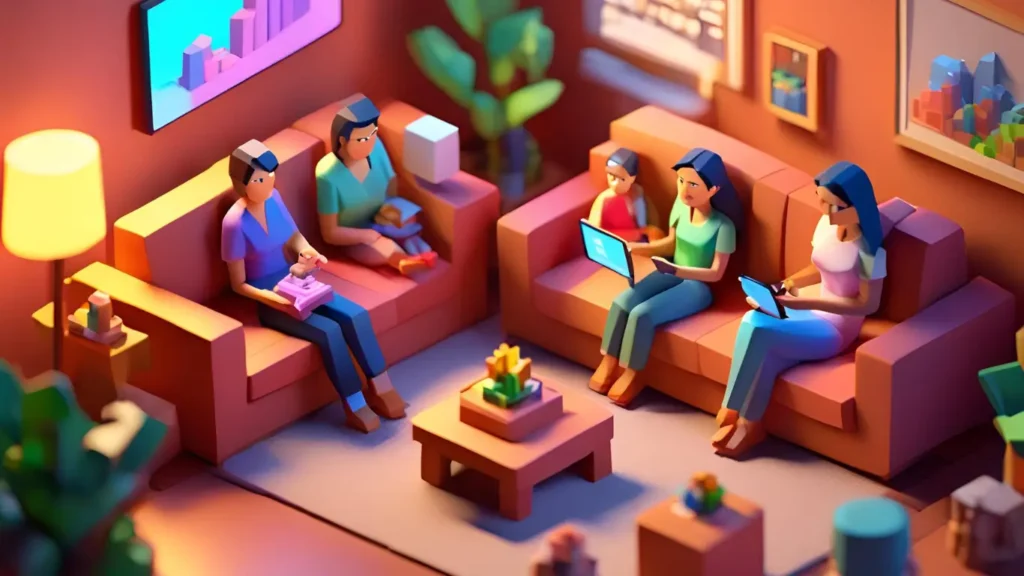In our hyperconnected world, striking a healthy balance between screen time and genuine intimacy presents a growing challenge. This guide explores the complexities of managing digital presence to cultivate deeper, more meaningful relationships, ensuring quality connection thrives.
The Digital Divide: Understanding Screen Time vs. Intimacy
The digital revolution has reshaped nearly every aspect of our lives, including how we connect with others. While technology offers unprecedented ways to stay in touch, it also creates a subtle, often unnoticed, barrier to genuine intimacy. The constant presence of screens, from smartphones to tablets, can unintentionally erode the quality of our face-to-face interactions.
This modern challenge of Screen Time vs. Intimacy highlights a fundamental tension: the immediate gratification and endless distractions of screen time versus the deeper, more vulnerable engagement required for true intimacy. Relationships, whether romantic, familial, or platonic, thrive on presence, active listening, and shared experiences. These qualities often diminish when digital devices command our attention, showing the clear impact of Screen Time vs. Intimacy.
Recognizing this challenge is the first step toward finding a healthier balance. It is not about eliminating screens entirely. It is about understanding their impact on connection and intentionally prioritizing human interaction. The goal is to ensure technology serves to enhance our lives, rather than inadvertently detracting from our most important relationships. This intentional approach helps resolve the tension inherent in Screen Time vs. Intimacy.
Why Screen Time Often Harms Intimacy
The subtle ways digital devices infiltrate our daily lives can significantly impact our closest relationships. Understanding these mechanisms helps us identify and address the issue of Screen Time vs. Intimacy directly.
Constant Distraction and Partial Attention
When a phone is present, even face down, it reduces the quality of interaction. Our brains remain on alert, anticipating notifications. This leads to partial attention in conversations. It prevents deep engagement and active listening. Genuine intimacy requires full presence and undivided focus. A distracted mind struggles to provide this. This issue regarding Screen Time vs. Intimacy affects relationships deeply.
This constant state of readiness for digital input fragments our attention. It makes partners feel unheard or unimportant. This erodes the foundation of trust and connection necessary for intimacy. The challenge of balancing Screen Time vs. Intimacy becomes clear in these moments.
Reduced Quality Time and Shared Experiences
Screen time often replaces opportunities for shared real-world experiences. Instead of a conversation over dinner, partners might scroll through separate feeds. Instead of a walk together, individuals might retreat into their digital worlds. These missed moments, seemingly small, accumulate over time. This impacts the crucial balance of Screen Time vs. Intimacy.
Intimacy thrives on shared activities, mutual discovery, and simply being present together. When screens fill these voids, relationships miss out on vital bonding opportunities. The quantity of time spent together might remain the same, but its quality diminishes. The quality of Screen Time vs. Intimacy is key here.
Erosion of Emotional Connection and Empathy
Digital communication, while convenient, lacks the nuances of face-to-face interaction. We miss facial expressions, tone of voice, and body language. These non-verbal cues are critical for building empathy and understanding. Relying heavily on digital exchanges can lead to misunderstandings and reduce emotional depth.
The impersonal nature of some online interactions also creates a sense of detachment. This can make it harder to connect emotionally with those physically present. The barrier of a screen can inadvertently foster emotional distance. Understanding the interplay of Screen Time vs. Intimacy reveals why genuine connection fades.
Striking the Balance: Practical Strategies for Screen Time vs. Intimacy
Finding a harmonious relationship with technology requires conscious effort and intentional strategies. These approaches help you regain control over screen time and cultivate deeper connections, directly addressing the challenge of Screen Time vs. Intimacy.
1. Establish Tech-Free Zones
Designate specific areas in your home as tech-free zones. The dining table, bedroom, or living room during family time are excellent candidates. This signals that these spaces prioritize human interaction. It encourages conversations and shared presence without digital distractions. Consistent adherence to these zones creates clear boundaries. This strategy greatly improves the balance of Screen Time vs. Intimacy.
2. Implement Tech-Free Times
Set aside specific periods each day or week for tech-free time with loved ones. This could be during meals, an hour before bed, or a dedicated evening for conversation or activities. Put phones away, turn off notifications, and fully engage. This ensures quality time is protected and prioritized. This protects valuable moments from the encroachment of Screen Time vs. Intimacy conflicts.
3. Practice Mindful Screen Use
Become aware of your own digital habits. Before picking up your phone, ask yourself why. Is it out of habit, boredom, or a genuine need? Set intentions for screen use. This helps you be more deliberate. Mindful use means engaging with purpose, not just passively scrolling. This personal discipline is fundamental for managing Screen Time vs. Intimacy effectively.
4. Plan Shared Real-World Experiences
Actively plan activities that encourage face-to-face interaction and shared experiences. This could be cooking together, going for a walk, playing a board game, or trying a new hobby. These moments create bonding opportunities and build common memories. They strengthen the relationship beyond digital interactions, positively impacting Screen Time vs. Intimacy.
5. Communicate Expectations Openly
Discuss expectations around screen time and its impact on your relationship with your partner or family members. Express how device use makes you feel without blame. Agree on mutual boundaries and strategies. Open communication builds understanding and shared commitment. This direct approach resolves potential conflicts arising from Screen Time vs. Intimacy issues.
6. Prioritize Active Listening and Presence
When engaging in conversation, put your phone away and give your full attention. Maintain eye contact. Listen to understand, not just to reply. Ask clarifying questions. This signals that you value the other person and their words. Active listening fosters deeper connection and empathy. This core skill transforms interactions and improves the balance of Screen Time vs. Intimacy.
7. Lead by Example
Children and partners often mirror behaviors. Model the balance you wish to see in your relationships. Demonstrate healthy screen habits. Show that you prioritize real-world connections. Your actions speak louder than words in setting a positive example for managing Screen Time vs. Intimacy.
Budgeting for Connection: Investing in Intimacy
While technology often comes with costs, cultivating intimacy usually involves investing time and intention rather than significant money. Budgeting for connection means prioritizing experiences that deepen relationships. This budgeting strategy helps manage Screen Time vs. Intimacy effectively.
Prioritize Experiences Over Digital Upgrades
Instead of constantly upgrading to the latest device or subscribing to numerous streaming services, allocate funds towards shared experiences. This could be a weekend getaway, tickets to an event, a cooking class, or a special meal out. These investments create lasting memories and strengthen bonds.
Consider the long-term value. Experiences often yield greater returns in terms of relationship satisfaction than material possessions. This conscious choice supports a healthier approach to Screen Time vs. Intimacy.
Low-Cost or Free Connection Activities
Many activities that foster intimacy require minimal or no financial outlay. A walk in the park, a picnic at home, playing board games, having deep conversations, or simply sitting together and listening to music. These simple acts of presence and shared time are invaluable.
Focus on creating opportunities for genuine interaction without relying on expensive entertainment. Creativity and intention can lead to powerful moments of connection, improving your Screen Time vs. Intimacy balance.
Mindful Tech Spending
If you do invest in technology, choose wisely. Consider how a new device or service might genuinely enhance connection (e.g., video calls with distant family) rather than create distance. Evaluate whether it adds value to your relationships or simply provides another distraction.
Budgeting for technology should reflect its intended purpose: a tool to support life, not dominate it. This mindfulness helps maintain a healthy balance in Screen Time vs. Intimacy.
Nurturing Relationships: Caring for Connection
Nurturing intimacy requires ongoing effort and consistent attention. Like a garden, relationships thrive with regular care, protecting them from the weeds of distraction. These consistent efforts help maintain the delicate balance of Screen Time vs. Intimacy.
Consistent Quality Time
Make quality time a non-negotiable part of your routine. This means scheduling specific time for your loved ones, free from digital interruption. Consistency builds anticipation and reinforces the value you place on your relationship. It communicates commitment.
Even short, frequent check-ins build connection. Consistency matters more than duration. This direct engagement fosters intimacy over passive screen time.
Active Empathy and Validation
Practice active empathy: truly listen to understand the other person’s perspective and feelings. Validate their emotions, even if you do not agree with their viewpoint. This creates a safe space for open communication and vulnerability.
Empathy fosters deeper emotional connection. It shows you care about their inner world. This strengthens the foundation of intimacy, countering the superficiality often associated with excessive screen time.
Mindful Conflict Resolution
Disagreements are natural. Approach conflicts with a focus on understanding and resolution, not blame. Avoid bringing devices into arguments. Listen to each other fully. Communicate your needs clearly and respectfully.
Effective conflict resolution builds resilience in relationships. It teaches you how to navigate challenges together. This process often deepens intimacy rather than weakening it, as can happen when Screen Time vs. Intimacy is poorly managed.
Read Also: Is Tech Killing Face-to-Face Relationships?
Innovations: When Technology Enhances Intimacy
While often seen as a barrier, technology can paradoxically enhance intimacy when used intentionally. Recent innovations offer tools to strengthen connections, particularly over distance. These innovations aim to improve the balance of Screen Time vs. Intimacy.
Enhanced Video Communication and Virtual Shared Experiences
Video calls have become more sophisticated, offering higher quality and more stable connections. Innovations like shared screen viewing or virtual backgrounds create more immersive experiences. Some platforms even allow for shared movie watching or game playing, bringing distant loved ones together in virtual common spaces.
These tools bridge geographical gaps. They allow for visual cues and real-time interaction. They make long-distance relationships more vibrant, supporting intimacy despite physical separation.
Relationship-Focused Apps and Reminders
A new wave of apps focuses on nurturing relationships. These might offer prompts for conversation starters, shared journals, or reminders for anniversaries and special occasions. Some provide guided activities for couples or families. These tools act as digital assistants for connection.
They help busy individuals prioritize their relationships. They provide gentle nudges to engage meaningfully, reinforcing intimacy even when screen time competes for attention.
Wearable Technology and Health Sharing
Wearable devices can offer a unique form of intimacy through shared health goals or progress tracking. Couples might share fitness data, encourage each other, or engage in friendly competitions. This fosters a sense of shared purpose and mutual support.
This type of technological integration promotes well-being together. It creates a subtle, yet powerful, bond through shared health journeys, showing a positive facet of Screen Time vs. Intimacy.
Making Your Final Decision on Screen Time vs. Intimacy
Balancing screen time and intimacy requires ongoing awareness and conscious choices. Focus on nurturing your relationships by prioritizing genuine connection over digital distraction. This ultimate decision about Screen Time vs. Intimacy shapes your interactions.
Prioritize real-world presence. Make tech-free zones and times non-negotiable. Your full attention is the most valuable gift you can give your loved ones. This builds trust and deepens bonds.
Consider how technology serves your relationships. Does it bring you closer to distant loved ones, or does it create distance from those nearby? Use technology as a tool for connection, not an escape from it.
Do not overlook the power of small, consistent efforts. Daily acts of presence, active listening, and shared moments accumulate into a strong, resilient relationship. These seemingly minor choices make a significant impact on Screen Time vs. Intimacy.
Remember, the goal is not to demonize technology, but to master its use. When you consciously manage your Screen Time vs. Intimacy, you create a life rich with genuine connection and fulfilling relationships.
Cultivating Connection in a Digital Age
The tension between screen time and intimacy is a defining challenge of our era. However, with intentional strategies and a conscious approach, you can successfully navigate this balance to foster deeper, more meaningful relationships.
Take time to reflect on your digital habits. Consider how they impact your closest connections. Remember that quality interaction is paramount. Your efforts to prioritize presence will yield invaluable returns in relationship satisfaction.
As you embark on this journey of digital well-being, remain patient with yourself and others. Adapting ingrained habits takes time. Every step toward more mindful use strengthens your bonds.
By applying these insights, you can transform your relationship with technology. You ensure it supports, rather than detracts from, the intimacy that enriches your life. Embrace the power of genuine human connection.
Frequently Asked Questions About Screen Time vs. Intimacy
Does all screen time harm intimacy?
No, not all screen time harms intimacy. Screen time used for shared experiences (like watching a movie together), planning activities, or connecting with distant loved ones can enhance intimacy. The key lies in mindful use and balancing Screen Time vs. Intimacy with real-world, face-to-face interaction.
How can I start a conversation about screen time with my partner?
Approach the conversation with empathy, focusing on your feelings rather than blame. Say, “I miss our conversations when we are on our phones,” instead of “You are always on your phone.” Suggest solutions together, like tech-free dinner times.
What are “tech-free zones”?
Tech-free zones are designated areas in your home where digital devices are not allowed. Common examples include the dining table, bedroom, or a specific part of the living room. These areas prioritize face-to-face interaction and present connection, helping manage Screen Time vs. Intimacy.
Can social media actually improve intimacy?
For some, social media can improve intimacy by allowing shared experiences (e.g., sharing funny content with a partner), coordinating social events, or providing insights into a loved one’s interests. However, passive scrolling or comparison often detracts from real connection.
How can parents model healthy screen habits for children?
Parents can model healthy screen habits by setting their own device boundaries, engaging in tech-free family activities, and openly discussing their own digital choices. Demonstrating mindful use is more impactful than simply imposing rules on children. This applies to managing Screen Time vs. Intimacy within the family.



